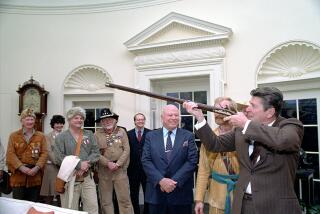GOP’s Reign Intrudes on Clinton Economic Summit : Debate: Participants back President on most issues. But they are fearful of Republicans’ influence.
- Share via
ATLANTA — President Clinton led 152 business people, academics and struggling wage-earners through an economic brainstorming session Wednesday that dramatized his own rocky political journey since he last conducted such an exercise in December, 1992.
He was President-elect Clinton then, broadly hinting at a closely watched Little Rock, Ark., gathering of his plans to increase some federal spending, while tackling the many-tentacled health care system. Now, he is the incumbent President, eager to claim credit for a buoyant economy but clearly on the defensive against an opposition that threatens at nearly every turn to undo what he has achieved.
Participants at the White House’s Southern Economic Regional Conference at Emory University in Atlanta seemed almost without exception to endorse Clinton’s programs of increased subsidies for education, job training and business development. But unlike two years ago, their pleas on taxation, civil rights, health care, education and business aid seemed to be driven as often as not by fears that the Republican view of government’s role is taking hold.
As he gazed thoughtfully over his reading glasses, Clinton appeared to concede tacitly that the agenda of his conference had been set by the opposition.
The role of government is now the “great debate,” Clinton said.
“It used to be the prevailing theory was there was a big government solution for every problem,” he said. “Now the prevailing theory is that government would mess up a one-car parade and, if it didn’t exist, America wouldn’t have any problems. Both theories are wrong. . . . “
The all-day conference was one of a series planned around the country.
It also provided the President a forum for what he termed in an interview with Cox News Service as a “midterm checkup” on the economy’s health.
On that score, the President defended his fiscal policies and took credit for the creation of 6 million new jobs, a lower unemployment rate, stable inflation, tax breaks for small businesses and the working poor and a reduced deficit.
But he conceded that the “economic news is not all good.”
The President devoted the lion’s share of the six hours allotted for the seminar to hearing the concerns of participants.
Health care costs are now rising at one-third the rate they were when Clinton took office, said Hugh Westbrook, president of a Miami hospice care concern. But since industry has done nothing to extend coverage to the uninsured, “comprehensive reform is still needed,” he said.
Clinton heard a warning from Ron Pollack, executive director of the health reform lobby Families USA, that threatened GOP cuts in the Medicaid program of health care for the poor would dangerously erode the program.
GOP efforts to reverse government affirmative action programs also brought warnings.
If the minorities’ hopes for advancement are dashed, “we won’t have to worry about the angry white man,” said former Atlanta Mayor Maynard Jackson. “We’ll have to worry about the angry black man.”
And Clinton heard a warning that the GOP is planning to set back the program that has done most for the poor, the earned income tax credit that eases taxes on lower-income working families.
Bob Greenstein, an economist at the liberal Center on Budget and Policy Priorities, said that Republican plans which would allow inflation to reduce the credit in coming years would be a heavy blow.
Clinton traveled to Tallahassee, Fla., late in the day and announced that the U.S. Armed Forces Southern Command, now headquartered in Panama, will move to the Miami area in 1998. Administration officials said the command will be based at a Coast Guard facility at Richmond Heights in South Dade County. It will employ 700 people and have a $20-million payroll.
More to Read
Get the L.A. Times Politics newsletter
Deeply reported insights into legislation, politics and policy from Sacramento, Washington and beyond. In your inbox twice per week.
You may occasionally receive promotional content from the Los Angeles Times.









